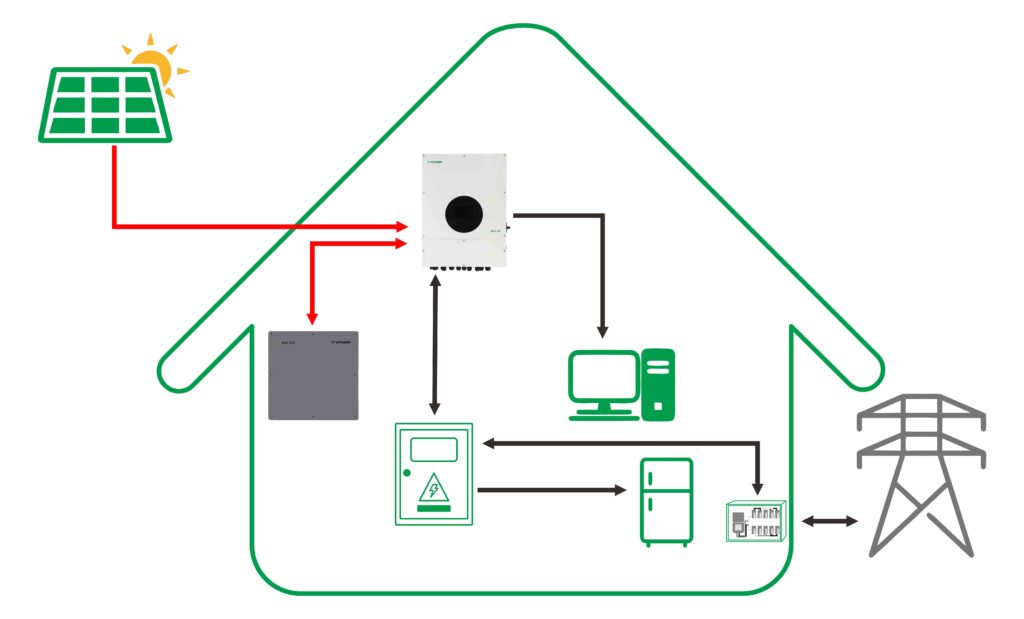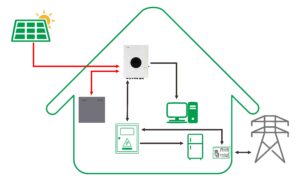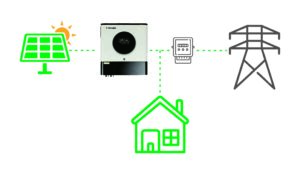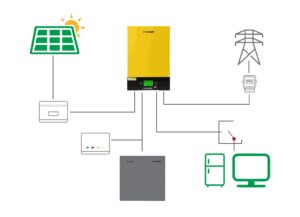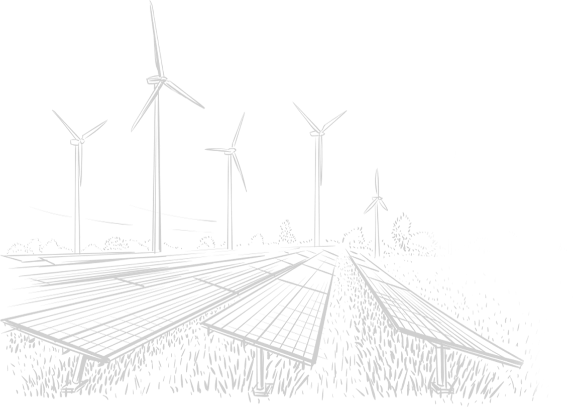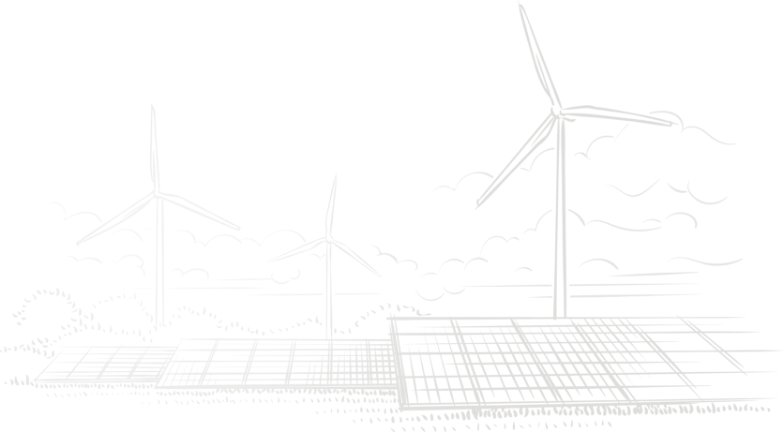A storage system is a device or system used to store electrical energy, which can be stored when needed and then released when required. These systems store energy by converting it into other forms (such as chemical energy, mechanical energy, etc.) for storage, and then converting it back into electrical energy when needed. Storage systems can encompass various technologies, including battery storage, compressed air energy storage, pumped hydro storage, etc. They serve various applications, including backup power, smoothing the fluctuations of renewable energy sources, optimizing energy usage, and addressing peak electricity demands.
Why would you store solar energy?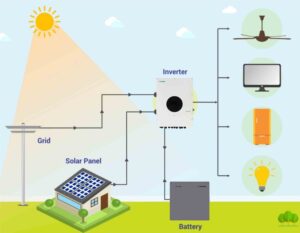
The ”disadvantage” of a photovoltaic system is that the solar energy generated is not necessarily available when you want it; it is only produced when the sun is shining. It’s the case that many people are not at home during the day, which means a large part of the energy generated at these times will be fed into the grid. Equally, there will be a need to take power from the grid at times when energy requirements are high.
A home storage system is designed to address this very problem – to improve availability, so that the solar energy you generated during the day is available from the evening right through to the morning.
Depending on the size of the storage system and the PV yield, you will be able to cover up to 100% of your energy requirements for most of the year.
Storing solar energy offers several advantages and significance:
1、Smoothing Energy Fluctuations: Solar energy is intermittent, dependent on sunlight and weather conditions. Storing solar energy helps smooth out its generation fluctuations, ensuring a more stable and reliable energy supply.
2、Providing Backup Power: Storing solar energy provides backup power, maintaining the operation of critical equipment and services during nighttime or inclement weather. This is crucial for addressing grid failures or emergencies.
3、Optimizing Energy Utilization: Storing solar energy during peak generation periods and releasing it during peak demand periods optimizes energy utilization and reduces energy costs.
4、Enhancing Self-Sufficiency: For off-grid or hybrid systems, storing solar energy enhances system self-sufficiency, reducing reliance on external energy sources.
5、Improving Energy Sustainability: Storing solar energy improves energy sustainability by allowing excess solar energy to be stored for later use, reducing dependence on traditional energy sources.
6、Reducing Carbon Emissions: Using stored solar energy reduces the demand for high-carbon-emission energy sources like coal, contributing to lower carbon emissions and mitigating environmental impacts.
Who will benefit from having a storage system?
Ownership of storage systems benefits individuals, businesses, communities, and the energy industry as a whole. Individuals and businesses can optimize energy usage by smoothing energy fluctuations, lowering energy costs, and providing backup power. Off-grid communities and regions can enjoy stable electricity supply, enhancing their quality of life. The energy industry can increase investment returns by improving the reliability and competitiveness of renewable energy projects. Additionally, grid operators and government environmental organizations can benefit from storage systems by improving grid stability, achieving energy transition goals, and reducing greenhouse gas emissions.
Another significant motivation for having a battery storage system is to be independent from energy suppliers: you want to be able to supply your own power.
Will I still have power if there is a power outage?
If there’s a power outage, your storage system can serve the following purposes:
1、Providing Backup Power: The storage system can act as a backup power source, ensuring continuous electricity supply for your home or business, thereby maintaining the operation of critical equipment and services, preventing disruptions in daily life or business operations.
2、Ensuring Safety: During emergencies such as power outages, the storage system ensures safety by powering essential equipment such as lighting, communication, and security systems, safeguarding you, your family, or employees.
3、Maintaining Quality of Life: During a power outage, the storage system can maintain your quality of life by preserving home comfort, ensuring that refrigerators and refrigeration equipment continue to operate, preserving food.
4、Providing Emergency Communication: The storage system can also provide emergency communication, ensuring that you can stay connected with the outside world, obtain necessary information, and seek assistance.
Even if the power outage lasts for several days, using FOXPOWER storage solution, your power supply is still safe because the battery will be charged by your photovoltaic system during the day.
There is a significant difference in this respect between the different providers – many storage systems cannot be recharged when operating in backup power mode. This means that only the power stored in the battery at the time the power cut occurred can be used. Your PV system will no longer be supplying any power and, once the battery has run down, that’s it. These are all aspects to take into consideration when purchasing a storage system.
How to flexibly save electricity costs through energy storage systems
Here are ways to flexibly save on electricity costs using a storage system:
1、Charge During Low Price Periods: Store electricity during off-peak hours, such as at night or early morning when electricity prices are lower. Then, use the stored electricity during peak hours to avoid purchasing expensive power.
2、Smooth Peak Demand: Release stored electricity during peak demand periods to smooth out peak usage, avoiding exceeding quota limits that result in higher electricity prices.
3、Participate in Grid Dispatch Markets: In some regions, storage systems can participate in grid dispatch markets, providing flexible power regulation services in response to changing demand and earning revenue while saving on electricity costs.
4、Maximize Self-Sufficiency: For off-grid or hybrid systems, maximize self-sufficiency by utilizing solar power generation and storage systems, reducing reliance on the grid and lowering electricity expenses.
5、Reduce Inverter Losses: For solar systems, store solar energy directly into the storage system instead of converting it to AC power through inverters before storage. This reduces inverter losses and improves energy utilization efficiency.
Photovoltaic+Energy Storage System: How to Operate?
The operation principle of a photovoltaic (PV) + energy storage system involves converting solar energy into electricity and storing excess energy for later use. Initially, the PV component utilizes solar panels to convert sunlight into direct current (DC) electricity. Any surplus electricity generated is stored in the energy storage system, typically through battery components that convert it into chemical energy for storage. When electricity is needed, the energy storage system releases the stored energy, converting it back into electricity and supplying it to the required devices or grid. The entire system is monitored and controlled by electronic control and management systems to ensure coordination and balance between PV generation, energy storage, and electricity supply, thereby achieving efficient utilization and flexible control of energy resources.

